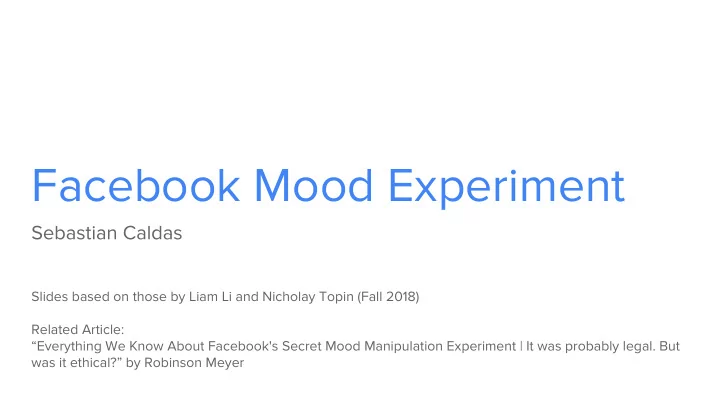

Facebook Mood Experiment Sebastian Caldas Slides based on those by Liam Li and Nicholay Topin (Fall 2018) Related Article: “Everything We Know About Facebook's Secret Mood Manipulation Experiment | It was probably legal. But was it ethical?” by Robinson Meyer
Background
Facebook modified users’ newsfeeds to see how it impacted their moods. 3
Facebook modified users’ newsfeeds to see how it impacted their moods. 4
Facebook modified users’ newsfeeds to see how it impacted their moods. 5
Timeline
2012 ● Facebook gathers data ● Cornell IRB approves analysis 2013 ● Paper written by FB / Cornell researchers ● Submitted to PNAS 2014 ● Published in PNAS ● Media reaction and users’ outrage (June 2014) 7
2012 ● Facebook gathers data ● Cornell IRB approves analysis 2013 ● Paper written by FB / Cornell researchers ● Submitted to PNAS 2014 ● Published in PNAS ● Media reaction and users’ outrage (June 2014) 8
2012 ● Facebook gathers data ● Cornell IRB approves analysis 2013 ● Paper written by FB / Cornell researchers ● Submitted to PNAS 2014 ● Paper published in PNAS ● Media reaction and users’ outrage (June 2014) 9
Detractors vs. Proponents
Detractors present the following concerns: The IBR approval Facebook Users were unable was conditioned manipulated to provide on Facebook’s its users’ moods informed consent approval 11
Detractors present the following concerns: Facebook manipulated its users’ mood The IBR approval Facebook Users were unable Previous emotional was conditioned manipulated to provide contagion studies on Facebook’s its users’ mood informed consent had been limited to approval crawling news feeds, without modifying them. 12
Detractors present the following concerns: Users were unable to provide informed consent The IBR approval Facebook The IBR approval ● According to the APA, was conditioned manipulated was conditioned informed consent should be on Facebook’s its users’ mood on Facebook’s obtained using reasonably approval understandable language. ● Participants should be able to withdraw their data. 13
Detractors present the following concerns: The IBR approval was conditioned on Facebook’s approval Facebook Users were unable Users were unable the researchers’ “revision manipulated to provide to provide letter said they had Cornell its users’ mood informed consent informed consent IRB approval as a ‘pre-existing dataset’ presumably from FB, who seems to have reviewed it as well in some unspecified way...” - Dr. Fiske 14
Meanwhile, proponents present the following arguments: The use of the data The experiment The impact on users is legal under helps Facebook was small and went Facebook’s improve its service unnoticed terms of service
Meanwhile, proponents present the following arguments: The use of the data is legal under Facebook’s The use of the data terms of service The experiment The impact on users is legal under helps Facebook was small and went “Facebook users relinquish the Facebook’s improve its service unnoticed use of their data for data terms of service analysis, testing, and research.” - Facebook’s TOS
Meanwhile, proponents present the following arguments: The experiment helps Facebook improve its service The use of the data “We do research to … make the The experiment The impact on users is legal under content people see on helps Facebook was small and went Facebook’s Facebook as relevant and improve its service unnoticed terms of service engaging as possible. A big part of this is understanding how people respond to different types of content.” - Facebook
Meanwhile, proponents present the following arguments: The impact on users was small and went unnoticed The use of the data The experiment The impact on users is legal under helps Facebook was small and went Facebook’s improve its service unnoticed terms of service
Discussion
Do you believe something unethical was done? 20
Was the data collection justified? 21
Should researchers use data collected in similar manners? 22
Why is informed consent necessary in this situation and not for for A/B testing on ads? 23
My opinion
Do you believe something unethical was done? ● If ethics are a social construct, then the public outcry may mean something unethical was indeed done. ● The root of the problem seems to be the perceived potential Facebook has to modify our behavior. ● Opting out is a must in this type of experiments. 25
Was the data collection justified? ● The motivation for the study is vague. ● Facebook may be underplaying the results. ● Although emotional contagion studies are common, they had never been performed at this scale. 26
Should researchers use data collected in similar manners? ● I don’t know. ● On one hand, the data may already be there. But do we want to encourage similar endeavours? 27
Why is informed consent necessary in this situation and not for for A/B testing on ads? ● Reactions to ads and emotional responses are different. 28
Recommend
More recommend